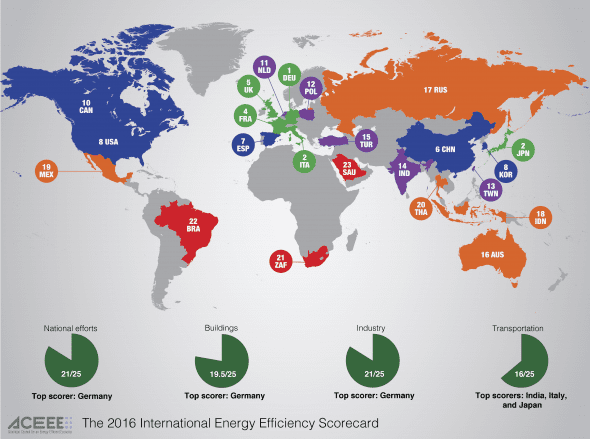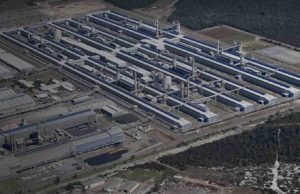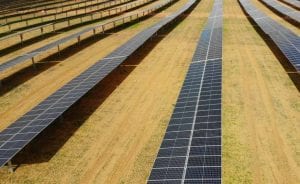A new report ranking the world’s largest economies on energy efficiency has once again found Australia lacking, moving in reverse from 10th position out of a field of 16 in 2014, to 16th out of 23 in 2016.

Energy efficiency, often described as the “low-hanging fruit” of global climate policy, has been embraced by governments around the world as an easy, cheap and immediate way to cut greenhouse gas emissions, that usually has the added upside of saving business, industry and consumers money.
The 2016 International Energy Efficiency Scorecard, published this week by the American Council for an Energy-Efficient Economy (ACEEE), ranks the world’s 23 largest energy-consuming economies on their energy efficiency policies and programs, awarding a maximum of 100 points across four different categories, including buildings, industry, transportation, and national effort.
Leading the pack, again, in 2016 is Germany, followed by Italy and Japan, then France and the UK.
The US rose in its ranking from 13th place in 2014 to 8th position – a shift the report attributes, partly, to changes to the scoring methodology, which now allocates more weight to policy actions.
Australia, meanwhile, scored just 41 out of 100 for its efforts overall for the past two years, putting it below the average, behind Turkey, and “just slightly” ahead of Russia and Indonesia.

Australia scored particularly poorly – second from the bottom – in both the transportation and industrial energy efficiency sections. According to the report, this is most likely due to the fact that it has not updated its fuel economy standards for passenger vehicles since 2010, and has no fuel economy standards at all in place for heavy-duty trucks.
In addition, says the report, “Australia’s percentage of public transit use is low (approximately 12 per cent), and it invests only about $0.50 in rail facilities for every dollar spent on road construction and maintenance.”
On the “equally poor” industrial front, the report says that finding more energy efficient technologies for large energy users “is not a priority for the country,” and notes that in 2014, the government shut down its Energy Efficiency Opportunities program, “in an effort to reduce costs for businesses and abide by the current administration’s deregulation agenda.”
Slightly more encouraging is Australia’s performance in building energy efficiency, which as you can see in the graph above is around three times better than for transport.
This, says the report, is due to its “fairly comprehensive building codes, building labelling program, and appliance and equipment labelling program.
Chris Dunstan, research director at the Institute for Sustainable Futures, says the result is discouraging, considering energy efficiency is “one of, if not the most important strategies” for reducing greenhouse gas emissions.
“You can see that Australia has been gradually sliding down the scale since 2012,” Dunstan told RenewEconomy on Thursday. And while that is partly because there are more countries being compared, it’s also because Australia is “performing worse compared to other countries.”
“It’s not just poor performance,” Dunstan added. “Australia is also falling behind because other countries are recognising the value of energy efficiency and lifting their game.”
On a positive note, Dunstan said, the 2016 report’s results don’t reflect the commitments of the National Energy Productivity Plan – the plan released by the federal government in 2015 to highlight the key strategies it will use to achieve its goal of increasing energy productivity by 40 per cent by 2030.
“We can lift our game significantly if we implement these commitments, especially in industrial energy efficiency … and fuel economy standards, which currently put us right at the back of the pack.
So, (the 2016 ranking is) discouraging, but we do have an opportunity by implementing those commitments. Hopefully next time we see a ranking like this Australia will be back up into the top half, if not near the top.”








